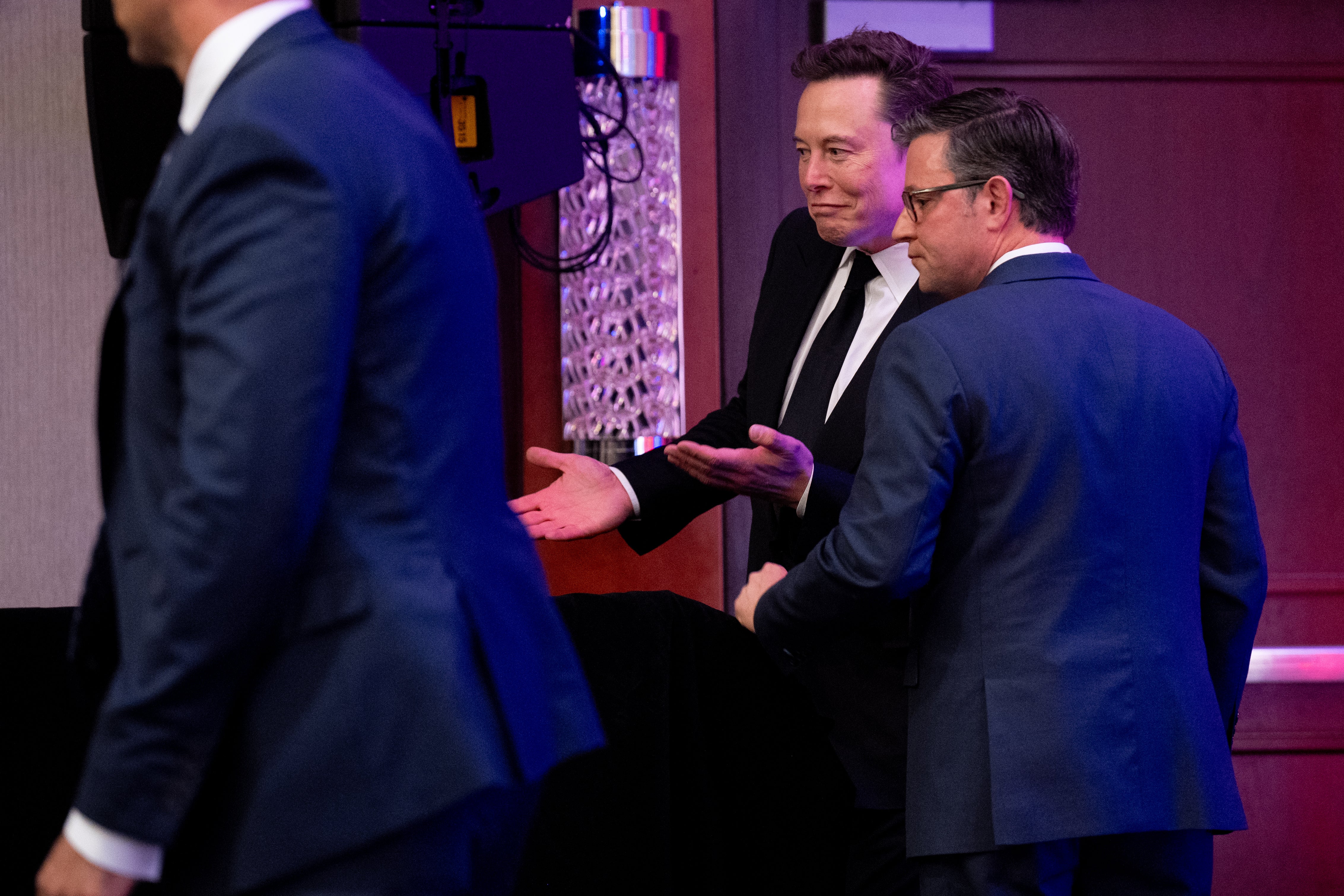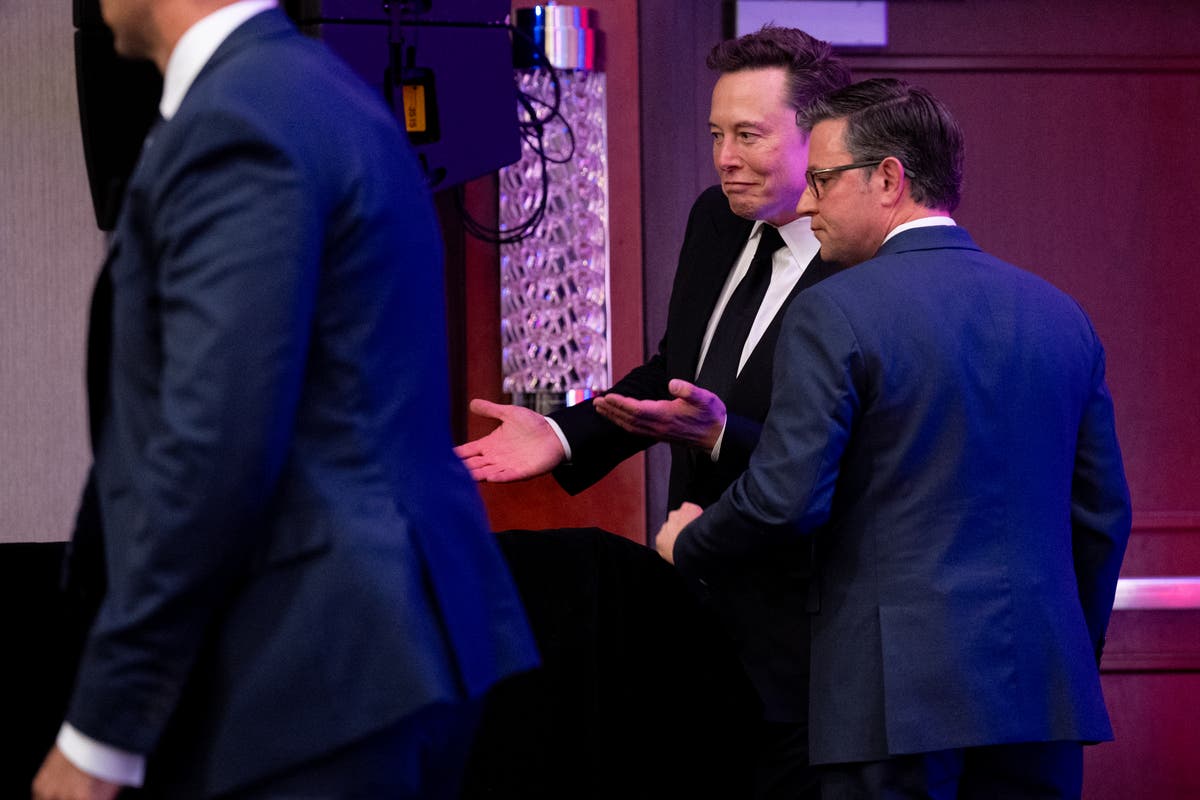An agreement was struck. Washington was ready to leave for the holidays having come together on a plan to fund the government and avert a shutdown — albeit with some grumbling on the Maga right.
Then Elon Musk jumped in. By Thursday morning, that deal had collapsed.
After days-long crusade by the Twitter and Tesla CEO, House Republicans began coming out in droves in opposition to the bill — in no small part due to a wave of phone calls from Republican voters furious over Musk’s tweets, which described the deal as “criminal”. Musk, in countless posts, raged against the legislation and overtly threatened to “end the careers” of any Republican who voted for it multiple times.
Trump came out against it too, after Musk declared that no government funding bill should be passed at all until his inauguration in January.
The deal, House Minority Leader Hakeem Jeffries said, had been “detonated by House Republicans” because the GOP caucus “has been ordered to shut down the government”.
“This reckless Republican-driven shutdown can be avoided if House Republicans will simply do what is right for the American people and stick with the bipartisan agreement that they themselves negotiated,” the Democratic leader told journalists at his party’s press conference Thursday morning.
And he says he does not know whether Speaker Mike Johnson is still calling the shots in terms of supplying Republican votes for the legislation. Responding to a reporter who asked, “who is in charge?”, and questioned Musk’s role, Jeffries responded: “That’s a great question. I don’t have the answers right now.”

His fellow Democrats spent the day dunking on their Republican colleagues for changing course on Musk’s whims. The Twitter CEO, Democrats argued, was the real president-elect.
“We have an outside influence who believes, I think, that he is president. And that is President Musk,” declared Rosa DeLauro, a senior Democrat and key ally of former Speaker Nancy Pelosi.
Pramila Jayapal, outgoing head of the Congressional Progressive Caucus, wrote on Twitter: “It’s clear who’s in charge, and it’s not President-elect Donald Trump.”
“Shadow President Elon Musk spent all day railing against Republicans’ CR, succeeded in killing the bill, and then Trump decided to follow his lead.”
Dan Goldman, speaking on CNN, added: “It’s one thing when you have Donald Trump governing by tweet…but now you have Elon Musk, an unelected oligarch, governing by tweet.”
One White House official who spoke to The Independent described the situation as evoking a sense of deja vu going back to late 2018, when then-President Trump reneged on a deal cut between then-House Speaker Paul Ryan, Minority Leader Nancy Pelosi, Senate Majority Leader Mitch McConnell and Minority Leader Chuck Schumer to avert a holiday shutdown because it did not include funding for a wall along the US-Mexico border.
But the official, a Washington veteran who has served in senior roles working for multiple House Democrats, expressed incredulity that the current situation was being prompted by two people who currently have no official role in government.
“I don’t think there’s a precedent for two billionaires — one unelected and one who isn’t yet in office — shutting down the government on Christmas — and after a deal was cut,” they said before opining that the challenge for Democrats will be whether they can “message this and get a message out that makes this stick to the two of them [Trump and Musk].”
“It’s a real question. Gravity isn’t what it used to be,” they added.
The derision even provoked an angry response from a Trump spokeswoman, incoming White House press secretary Karoline Leavitt: “”As soon as President Trump released his official stance on the CR, Republicans on Capitol Hill echoed his point of view. President Trump is the leader of the Republican Party. Full stop.”
GOP leadership entered the day looking isolated, with backbencher Trump acolytes coming out one after another to announce their opposition.
Johnson is due for a reckoning from the House Republican caucus, which threw Kevin McCarthy out of the speaker’s chair just a little more than one year ago and could easily do something similar in January when the chamber meets for the 119th Congress.
Congressional leaders unveiled the 1,500-page legislation to fund the government on Tuesday. The bill would continue funding for agencies and programs at current levels until mid-March, while also including billions for disaster relief funding. The massive piece of legislation also provided money to fully fund the rebuilding of the Francis Scott Key Bridge in Baltimore, Maryland, which collapsed after being struck by a disabled cargo ship earlier in March of 2024, as well as an extension of the annual Farm Bill.
Then, a newer, slimmer version emerged on Thursday. It contains the same extension of funding at current levels, the same disaster relief funding (including Key Bridge repairs) and Farm Bill extension. Gone was a provision expanding sales of E15, a type of fuel that uses more ethanol — a blow to farmers. Also gone were changes to the pharmacy benefit manager (PBM) system. But it would allow the GOP to avert fights over the debt ceiling until 2027, a major boon for the president’s legislative agenda.
Johnson is now desperately working to unify his caucus around this new deal. But Magaworld was fully calling for his head before Trump announced his support for the second round, and demanded that the GOP hold the line and shut down the government. Musk’s concerns about spending remaining at current levels remain unaddressed, even in the new version.
It isn’t really clear whether the new legislation has the political support within the GOP caucus to pass the lower chamber, to say nothing of the Democrat-controlled Senate. Spending hawks like Rep Tim Burchett, who spoke to The Independent late Thursday afternoon, were still not fully on board. Johnson and his team are preparing for votes this evening, with lawmakers eager to get out of town.
Jeffries, at his press conference on Thursday morning, called the latter demand “premature at best”, signalling that Democrats would not entertain it. His caucus would vote for nothing, Jeffries said, except the bill released this week after the two parties came to an agreement.
He flatly denied that Democrats would vote to support Mike Johnson, the GOP House speaker, in the upcoming speakership elections — where it looks increasingly likely that Johnson will face a rebellion within his caucus.
That leaves several questions to be answered in the weeks ahead: will Mike Johnson go the way of Kevin McCarthy? Will the House GOP operate for the next four years as a wholly subservient body bound to the whims of Musk and Trump? Will Musk, the incoming “DOGE” chief, overstep his boundaries by overshadowing the president-elect?
Or will Johnson find a spine, and win over enough of the rabble-rousers in his party to stave off an organized challenge?
One reality is definitely clear after Thursday: Mike Johnson wholly lacks the ability to stand up to either Trump or Musk, and whip his caucus into line. But it also seems like he lacks the ability to unify the disparate portions of his caucus even when he does have the backing of the incoming president.

